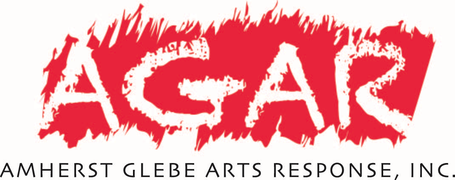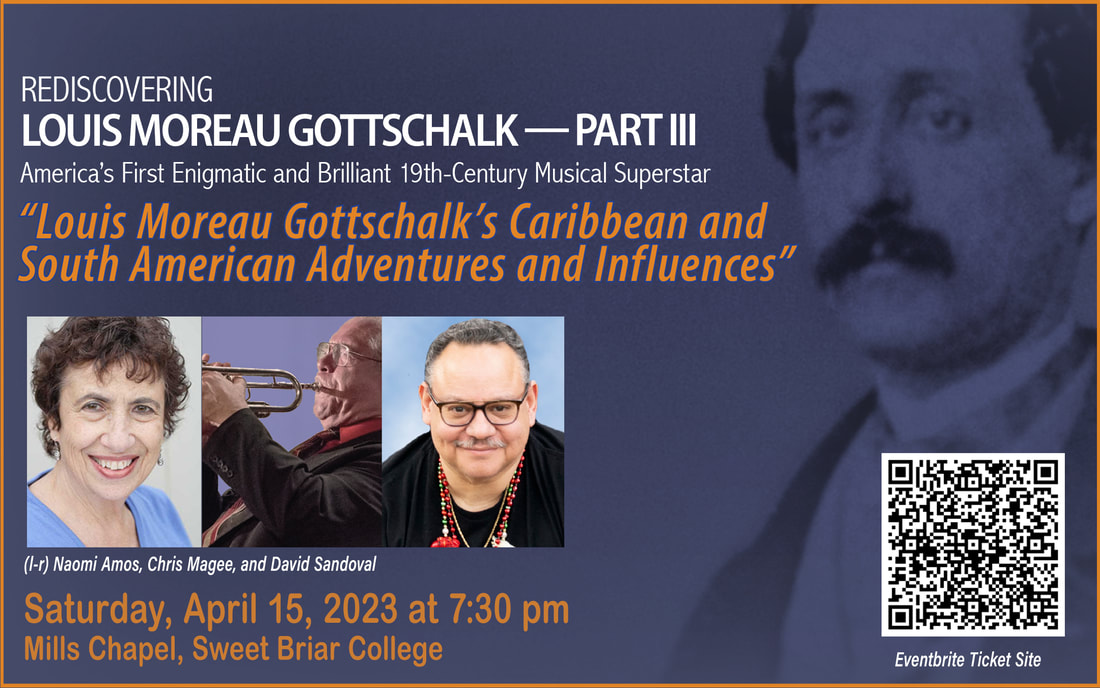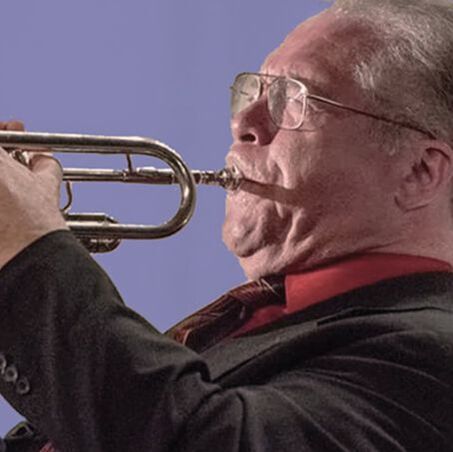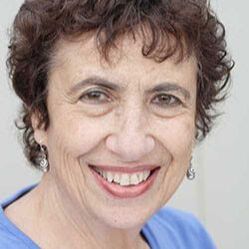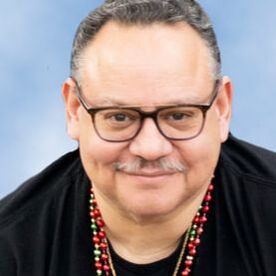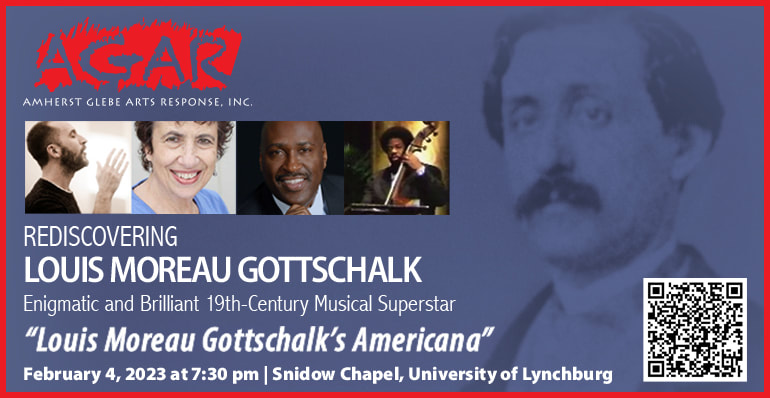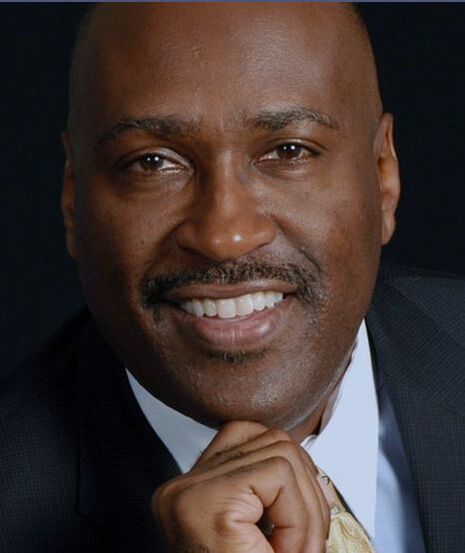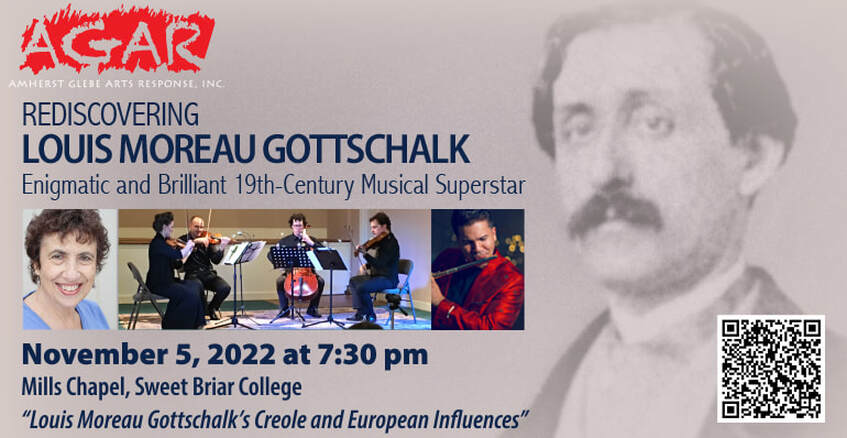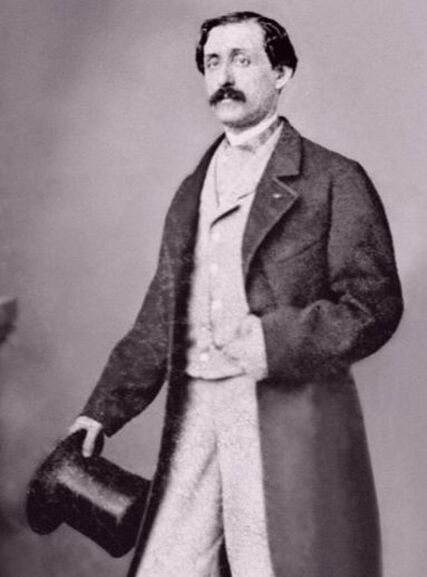FREE GOTTSCHALK YOUTUBE CONCERTS
The three concerts that comprised Amherst Glebe Arts Response’s Project about the life and work of Louis Moreau Gottschalk, “REDISCOVERING LOUIS MOREAU GOTTSCHALK, AMERICA'S FIRST ENIGMATIC AND BRILLIANT 19TH CENTURY SUPERSTAR” are now available for you to watch free of charge on AGAR’s YouTube channel.
The project was funded in part by project grants to Amherst Glebe Arts Response from Virginia Commission for the Arts, the National Endowment for the Arts, and Greater Lynchburg Community Foundation. Links and brief descriptions of each concert follow:
The three concerts that comprised Amherst Glebe Arts Response’s Project about the life and work of Louis Moreau Gottschalk, “REDISCOVERING LOUIS MOREAU GOTTSCHALK, AMERICA'S FIRST ENIGMATIC AND BRILLIANT 19TH CENTURY SUPERSTAR” are now available for you to watch free of charge on AGAR’s YouTube channel.
The project was funded in part by project grants to Amherst Glebe Arts Response from Virginia Commission for the Arts, the National Endowment for the Arts, and Greater Lynchburg Community Foundation. Links and brief descriptions of each concert follow:
“Louis Moreau Gottschalk’s Creole and European Influences”
https://youtu.be/t337vGJaZHU
Gottschalk's early years in New Orleans and Europe, and his early compositions. Introduced by Pianist Naomi Amos, and also featuring the LIYA String Quartet of Lynchburg, Giovanni Perez as flute soloist, and Alicia Carter, Soprano. Presented by Amherst Glebe Arts Response in Collaboration with the Music Department at Sweet Briar College. Concert took place on November 5, 2022 at Mills Chapel, Sweet Briar College.
Louis Moreau Gottschalk’s Americana
https://youtu.be/gGo9d8Y9fpU
Gottschalk’s return to the USA and national touring career from 1853 until after the American Civil War. Works by composers Gottschalk heard, his contemporaries, and composers whose work he influenced, especially in the development of ragtime, blues and early jazz. Gottschalk's compositions of the period. Concert features Naomi Amos, pianist, the Lynchburg Singers conducted by Dr. Jeremy Craft, vocalists Ronnie Schultz and Ann Mitchell; jazz pianist Dr. Weldon Hill and double bassist Michael Hawkins. Descriptions by Naomi Amos and Dr. Weldon Hill. Presented by Amherst Glebe Arts Response in collaboration with the Music Department of University of Lynchburg at Snidow Chapel, Lynchburg, on February 4, 2023.
Louis Moreau Gottschalk’s Caribbean & South American
Adventures and Influences
https://youtu.be/VPj3aexhpWQ
Gottschalk’s touring and composing in the Caribbean and South America, including his passing in 1869 at age 40. African and Afro-caribbean influences on Gottschalk and his works using these rhythmic patterns that influenced others. Naomi Amos, history, descriptions and piano. Los Gatos Latin Jazz Band: Chris Magee, comments, trumpet, arrangements; David Sandoval, descriptions, bongos; Vladimir Espinoza, congas; Greg Moody, alto sax and flute; Justin Berkley, tenor sax; Jeff Hofmann, bass; Tom Floyd, piano; Nick Moore, drums. Presented by Amherst Glebe Arts Response in Collaboration with the Music Department of Sweet Briar College at Mills Chapel, Sweet Briar on April 15, 2023.
https://youtu.be/t337vGJaZHU
Gottschalk's early years in New Orleans and Europe, and his early compositions. Introduced by Pianist Naomi Amos, and also featuring the LIYA String Quartet of Lynchburg, Giovanni Perez as flute soloist, and Alicia Carter, Soprano. Presented by Amherst Glebe Arts Response in Collaboration with the Music Department at Sweet Briar College. Concert took place on November 5, 2022 at Mills Chapel, Sweet Briar College.
Louis Moreau Gottschalk’s Americana
https://youtu.be/gGo9d8Y9fpU
Gottschalk’s return to the USA and national touring career from 1853 until after the American Civil War. Works by composers Gottschalk heard, his contemporaries, and composers whose work he influenced, especially in the development of ragtime, blues and early jazz. Gottschalk's compositions of the period. Concert features Naomi Amos, pianist, the Lynchburg Singers conducted by Dr. Jeremy Craft, vocalists Ronnie Schultz and Ann Mitchell; jazz pianist Dr. Weldon Hill and double bassist Michael Hawkins. Descriptions by Naomi Amos and Dr. Weldon Hill. Presented by Amherst Glebe Arts Response in collaboration with the Music Department of University of Lynchburg at Snidow Chapel, Lynchburg, on February 4, 2023.
Louis Moreau Gottschalk’s Caribbean & South American
Adventures and Influences
https://youtu.be/VPj3aexhpWQ
Gottschalk’s touring and composing in the Caribbean and South America, including his passing in 1869 at age 40. African and Afro-caribbean influences on Gottschalk and his works using these rhythmic patterns that influenced others. Naomi Amos, history, descriptions and piano. Los Gatos Latin Jazz Band: Chris Magee, comments, trumpet, arrangements; David Sandoval, descriptions, bongos; Vladimir Espinoza, congas; Greg Moody, alto sax and flute; Justin Berkley, tenor sax; Jeff Hofmann, bass; Tom Floyd, piano; Nick Moore, drums. Presented by Amherst Glebe Arts Response in Collaboration with the Music Department of Sweet Briar College at Mills Chapel, Sweet Briar on April 15, 2023.
LOUIS MOREAU GOTTSCHALK
“THE TRANSCONTINENTAL LIFE
AND MULTICULTURAL MUSICAL INFLUENCES OF
LOUIS MOREAU GOTTSCHALK”
Presented in three parts by Amherst Glebe Arts Response, Inc.
in collaboration with the Music Departments of Sweet Briar College
and the University of Lynchburg.
Gottschalk, Part III
TICKETS:
- $20 general admission
- $10 Sweet Briar College affiliated faculty and staff,
(Sweet Briar College students are free) - $5 students
Amherst Glebe Arts Response, Inc. (AGAR) in collaboration with the music department of Sweet Briar College presents the final concert in our “Rediscovering Louis Moreau Gottschalk” series on April 15, 2023, at 7:30 pm at Sweet Briar College’s Mills Chapel. The concert will begin with Naomi Amos playing Gottschalk’s compositions influenced by Afro-Caribbean rhythms.
University of Lynchburg’s Chris Magee and Los Gatos’ Puerto Rican bongo player David Sandoval will examine the influence of Gottschalk on music played in South America in the late 1860s and will give examples of early Latin Jazz.
Los Gatos musicians, well-known in our area, are: Chris Magee, trumpet and Flugelhorn, arranger; David Sandoval, bongos; Vladimir Espinoza, congas; Nick Moore, drums; Greg Moody, alto saxophone and flute; Justin Berkley, tenor sax and flute; Jeff Hofmann, bass; and Tom Floyd, jazz piano.
David Sandoval will speak about early Latin Jazz pieces that his Puerto Rican family wrote, including a suite of his stepfather, Ray Coen, “South in the Bronx” (“Madrugada - Before Sunrise, South in the Bronx. Streets and Ray’s Crib”) that Los Gatos will play at Sweet Briar. Also on the concert will be Coen’s best-known tune, “Puerto Rican Blues” made famous by David Sandoval’s Godfather, Roberto Roena in 1971.
University of Lynchburg’s Chris Magee and Los Gatos’ Puerto Rican bongo player David Sandoval will examine the influence of Gottschalk on music played in South America in the late 1860s and will give examples of early Latin Jazz.
Los Gatos musicians, well-known in our area, are: Chris Magee, trumpet and Flugelhorn, arranger; David Sandoval, bongos; Vladimir Espinoza, congas; Nick Moore, drums; Greg Moody, alto saxophone and flute; Justin Berkley, tenor sax and flute; Jeff Hofmann, bass; and Tom Floyd, jazz piano.
David Sandoval will speak about early Latin Jazz pieces that his Puerto Rican family wrote, including a suite of his stepfather, Ray Coen, “South in the Bronx” (“Madrugada - Before Sunrise, South in the Bronx. Streets and Ray’s Crib”) that Los Gatos will play at Sweet Briar. Also on the concert will be Coen’s best-known tune, “Puerto Rican Blues” made famous by David Sandoval’s Godfather, Roberto Roena in 1971.
|
Chris Magee, leader, trumpeter and flugelhorn player and arranger for Los Gatos has played lead trumpet for such artists as Wayne Newton, The Temptations, The Four Tops and the O’Jays, and he was staff trumpeter and arranger at Walt Disney World in Orlando, Florida.
Chris directs the Jazz Ensemble at University of Lynchburg and teaches trumpet, music appreciation, and courses in world music, music appreciation, conducting, and brass methods. Previously, Chris was Assistant Professor of Music at Northeast Lakeview College in Universal City, Texas, and directed the jazz ensemble at Trinity University in San Antonio, Texas. Chris is a native of Harrisonburg, Virginia, and resides in Bedford. He received the Bachelor and Master of Music degrees from James Madison University and the Doctor of Musical Arts Degree from the University of Iowa. |
Naomi Amos is the artistic director for AGAR’s Rediscovering Louis Moreau Gottschalk Project. She is the music director for Congregation Agudath Sholom’s High Holy Days services and other special events, and teaches piano in her home studio.
Naomi accompanied and coached for eleven operas at Opera on the James. From 2011-2016 she played on three 8-hand piano concerts for Forte Chamber Music. Also for Forte, Amos played three chamber concerts as pianist. She is a popular music lecture-recitalist on topics such as “The Effects of the Melting Pot,” “Music of George and Ira Gershwin,” and “Music of the Depression.” Naomi received her B.A. at the University of Rochester and the Eastman School of Music, and her Master of Music at Eastman. She has taught in the music departments of Wesleyan University and Trinity College, both in Connecticut. From 2011-2022, she was a faculty member in the Westover Honors College at Lynchburg College, teaching an honors seminar on Arts in the Depression, and in the University of Lynchburg Senior Symposium program. |
Percussionist David Sandoval was born into a family of musicians and raised in Santurce, Puerto Rico, where he performed in several local salsa bands. His father played bongó for famous Puerto Rican trumpeter Mario Ortiz and David has played with such greats as Jose Justo Canales and Nacho Sanabria.
David’s styles range from Afro-Cuban to Latin jazz to merengue to salsa beats. His stepfather Ray Coen, a well-known pianist/arranger/ composer, afforded him the opportunity to learn from such musical talents as Roy Rosario, Papo Pepin, Roberto Roena (his godfather) and Rafael Cortijo. Using his talents as a percussionist, David strives to foster ethnic diversity and cross racial and ethnical barriers. His diverse percussion skills bring a highly spirited flavor to the already spicy rhythm section. It has been said that David, “can be as smooth as sugar cane or as fiery as sazón.” |
Gottschalk, Part II
Louis Moreau Gottschalk was the first American international sensation as both pianist and composer. He drew from European, Creole, African, U.S. and Latino influences, and led the way to ragtime and jazz. He was a true original and his many delightful contributions are now again becoming popular with scholars and audiences.
- Introduction, musical narration and comments will be by Lynchburg Musicologist and Concert Pianist Naomi Amos. Amos will play James Hewitt’s “Yankee Doodle and Variations,” and several of Gottschalk’s touring favorites including his mega-hit “The Banjo.” Amos will also share stories of Gottschalk’s national U.S. tours in the 1850’s and during the Civil War.
- Dr. Jeremy Craft will conduct The Lynchburg Singers, a University of Lynchburg chorus, in performing four songs by Gottschalk’s contemporary, Stephen Foster. They also will sing Gottschalk’s hymn: “Holy Spirit, Light Divine” and a romantic song he composed, “O Loving Heart, Trust On!”
- “Soulsters“ Ann Mitchell and Ronnie Shoultz sing Creole Music and Haitian Songs heard by Louis Moreau Gottschalk and his sister Clara sung by their grandmother and a nursemaid in their childhood.
- Dr. Weldon Hill, renowned Richmond jazz pianist and double bassist Michael Hawkins will play piano works illustrating how Gottschalk influenced the development of African-American Ragtime and early Jazz of the late 19th and 20th Centuries.
- $20 general admission
- $10 U. of Lynchburg affiliated faculty and staff, (U. of Lynchburg students are free)
- $5 students
A musicologist, composer, and pianist, Dr. Weldon Hill is active as a performer, composer, and writer. He is most well known as a pianist, having shared the stage with artists such as Jon Faddis, Joe Williams, Steve Wilson, Marleana Shaw, Benny Carter, Jae Sinnett, Andrew White, Ron Elliston, and Jo Marie Payton. His own piano trio has performed with Donald Harrison, Veronica Swift, Lori Williams, Renee Marie, Cecile Calloway, Denzal Sinclair, Andrew White, and Earnie Andrews, among others. In addition to his own trio, Hill also performs regularly with the Virginia Symphony Jazz Orchestra and Symphony Pops and the United States Air Force Rhythm in Blues Jazz Ensemble. As pianist with the Great American Music Ensemble (an often-featured big band at the Kennedy Center and for National Public Radio) and with such artists as Herb Jeffries, Jimmy Heath, Benny Carter, Christian McBride, Ronnie Wells, Milt Hinton, and Ethel Ennis. His discography includes recordings with the Great American Music Ensemble, Plunky and Oneness, Bill McGee, James Gates and the Weldon Hill Trio.
A native of Richmond, Virginia, Hill holds a Bachelor of Arts degree in music education from Virginia Union University (Richmond) and Master of Music (in composition) and Doctor of Philosophy (musicology/music theory) degrees from the Catholic University of America (Washington, DC). His dissertation, a comprehensive analysis and history of Duke Ellington’s Sacred Concerts, is considered the seminal work on the subject in musicology. He completed post-graduate work at Virginia Commonwealth University (Richmond) in jazz studies and served as Pep Band Director. Hill was a piano student of Russell Wilson, having also studied with Ralph Ostoff and Bob Hallahan and participated in master classes and other sessions with Mulgrew Miller, Mary Lou Williams, Freddie Waits, Billy Taylor, and Jackie Byard, among others. He was selected as one of 33 National Endowment for the Humanities Fellows in 1986; was awarded 1994 Plan for Social Excellence Post-Doctoral Fellowship to complete the Harvard University Management Development Program; and was selected as one of the 29 American Council on Education Fellows (class of 2000-01).
Hill began teaching in the VUU Department of Music in 1984 as Coordinator of Instrumental and Commercial Music at the rank of Assistant Professor. In this post, he assembled nationally recognized jazz ensembles, developed the Commercial Music/Jazz Studies curriculum, and continued to perform. He subsequently served as Chairperson of the Department of Music and Chairperson of the Division of Humanities. In 1993, Hill was appointed Dean of the VUU School of Arts and Sciences and Associate Professor of Music, and in 1998, Vice President for Academic Affairs. In 2001, he was promoted to Provost and Senior Vice President, during which time he served as the VUU Chief Operations and Academic Officer. In December 2003, Hill was appointed Dean of the School of Liberal Arts and Education at Virginia State University (VSU, Petersburg), and, in July 2009, he was appointed Provost and Vice President for Academic Affairs (VPAA) at VSU, and is now serving as a member of the university’s music faculty. He is also involved in educational and public affairs outside the university, currently serving on Virginia and National Boards, including those of the Grants Resource Center (a division of the American Association of Colleges and Universities), the Virginia University Research Partnership, the New College Institute, and the Virginia Wizard Advisory Board.
A native of Richmond, Virginia, Hill holds a Bachelor of Arts degree in music education from Virginia Union University (Richmond) and Master of Music (in composition) and Doctor of Philosophy (musicology/music theory) degrees from the Catholic University of America (Washington, DC). His dissertation, a comprehensive analysis and history of Duke Ellington’s Sacred Concerts, is considered the seminal work on the subject in musicology. He completed post-graduate work at Virginia Commonwealth University (Richmond) in jazz studies and served as Pep Band Director. Hill was a piano student of Russell Wilson, having also studied with Ralph Ostoff and Bob Hallahan and participated in master classes and other sessions with Mulgrew Miller, Mary Lou Williams, Freddie Waits, Billy Taylor, and Jackie Byard, among others. He was selected as one of 33 National Endowment for the Humanities Fellows in 1986; was awarded 1994 Plan for Social Excellence Post-Doctoral Fellowship to complete the Harvard University Management Development Program; and was selected as one of the 29 American Council on Education Fellows (class of 2000-01).
Hill began teaching in the VUU Department of Music in 1984 as Coordinator of Instrumental and Commercial Music at the rank of Assistant Professor. In this post, he assembled nationally recognized jazz ensembles, developed the Commercial Music/Jazz Studies curriculum, and continued to perform. He subsequently served as Chairperson of the Department of Music and Chairperson of the Division of Humanities. In 1993, Hill was appointed Dean of the VUU School of Arts and Sciences and Associate Professor of Music, and in 1998, Vice President for Academic Affairs. In 2001, he was promoted to Provost and Senior Vice President, during which time he served as the VUU Chief Operations and Academic Officer. In December 2003, Hill was appointed Dean of the School of Liberal Arts and Education at Virginia State University (VSU, Petersburg), and, in July 2009, he was appointed Provost and Vice President for Academic Affairs (VPAA) at VSU, and is now serving as a member of the university’s music faculty. He is also involved in educational and public affairs outside the university, currently serving on Virginia and National Boards, including those of the Grants Resource Center (a division of the American Association of Colleges and Universities), the Virginia University Research Partnership, the New College Institute, and the Virginia Wizard Advisory Board.
AGAR is prompting audiences to rediscover Gottschalk with three concerts (Nov. 5, 2022; Feb. 4, 2023; and April 15, 2023) and school and You Tube hospital events, This concert series is funded in part through a Project Grant from Virginia Commission for the Arts and National Endowment for the Arts and from the Greater Lynchburg Community Foundation.
|
Gottschalk, Part II 7:30 pm February 4, 2023 at Snidow Chapel, University of Lynchburg “Americana: Gottschalk’s Musical Journey from Stephen Foster and James Hewitt’s Influences to his own Influences on Early Ragtime and Jazz” Music of Louis Moreau Gottschalk, James Hewitt, Stephen Foster, Jelly Roll Martin, Scott Joplin, Isaac Williams and others.
Gottschalk, Part III 7:30 pm April 15, 2023 Mills Chapel, Sweet Briar College “Louis Moreau Gottschalk’s Caribbean and South American Adventures: How Travels Changed His Music, His Continued Romanticism, and His influences on Early Latin Jazz.” Featuring Louis Moreau Gottschalk’s late music memorializing his Latin American travels and musical trends that later emerged in Latin Jazz.
|
Louis Moreau Gottschalk was born in New Orleans in 1829 to a British-born Jewish father and a Louisiana Creole mother. As a child he heard African music in Congo Square and is said to have learned Creole songs from two Saint Domingue (now Haiti) natives, his grandmother Brusle and his Afro-Caribbean nurse, Sally.
Deemed a child prodigy, Gottschalk was sent by his parents to Paris to study piano in his 13th year. Inspired by concerts he attended performed by Chopin and Liszt, Gottschalk began to concertize professionally in 1849, composing and performing his piano works. He was congratulated by Chopin. Berlioz is reported to have found his American style of piano playing “fascinating.” After touring throughout Europe in his 20s, Gottschalk returned to the United States. His New York debut in 1853 was a monumental success. Gottschalk toured and composed throughout the USA, becoming especially well-known and popular for playing his own romantic works. He concertized in the West Indies and lived in Cuba for several years in the1850s. During the U.S. Civil War, Gottschalk supported the North, composing and playing popular nationalistic works, including his best known, “The Union.” Post-War, after a scandal in San Francisco, Gottschalk lived in South America until his death at age 40 in 1869, after performing in an exhausting Rio de Janeiro concert festival. |
